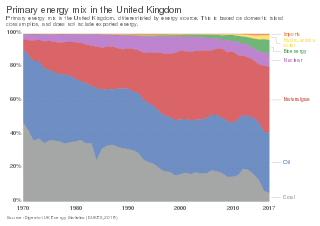The United Kingdom's Climate Change Programme was launched in November 2000 by the British government in response to its commitment agreed at the 1992 United Nations Conference on Environment and Development (UNCED). The 2000 programme was updated in March 2006 following a review launched in September 2004.
Various energy conservation measures are taken in the United Kingdom.

The energy policy of the United Kingdom refers to the United Kingdom's efforts towards reducing energy intensity, reducing energy poverty, and maintaining energy supply reliability. The United Kingdom has had success in this, though energy intensity remains high. There is an ambitious goal to reduce carbon dioxide emissions in future years, but it is unclear whether the programmes in place are sufficient to achieve this objective. Regarding energy self-sufficiency, UK policy does not address this issue, other than to concede historic energy security is currently ceasing to exist.

The Climate Change and Sustainable Energy Act 2006 is an Act of the Parliament of the United Kingdom which aims to boost the number of heat and electricity microgeneration installations in the United Kingdom, so helping to cut carbon emissions and reduce fuel poverty.
The Big Ask was a campaign by Friends of the Earth calling for a new climate change law in the United Kingdom and 15 other EU member states. The United Kingdom Government announced the introduction of the Climate Change Bill in the Queen's Speech on 15 November 2006. This was after 130,000 people across the country had asked their MP to support such a bill. Radiohead frontman Thom Yorke was a spokesperson for the campaign.
The Climate Change Committee (CCC), originally named the Committee on Climate Change, is an independent non-departmental public body, formed under the Climate Change Act (2008) to advise the United Kingdom and devolved Governments and Parliaments on tackling and preparing for climate change. The Committee provides advice on setting carbon budgets, and reports regularly to the Parliaments and Assemblies on the progress made in reducing greenhouse gas emissions. Notably, in 2019 the CCC recommended the adoption of a target of net zero greenhouse gas emissions by the United Kingdom by 2050. On 27 June 2019 the British Parliament amended the Climate Change Act (2008) to include a commitment to net zero emissions by 2050. The CCC also advises and comments on the UK's progress on climate change adaptation through updates to Parliament.
In 2005, an international conference titled Avoiding Dangerous Climate Change: A Scientific Symposium on Stabilisation of Greenhouse Gases examined the link between atmospheric greenhouse gas concentration and global warming and its effects. The conference name was derived from Article 2 of the charter for the United Nations Framework Convention on Climate Change The conference explored the possible impacts at different levels of greenhouse gas emissions and how the climate might be stabilized at a desired level. The conference took place under the United Kingdom's presidency of the G8, with the participation of around 200 "internationally renowned" scientists from 30 countries. It was chaired by Dennis Tirpak and hosted by the Hadley Centre for Climate Prediction and Research in Exeter, from 1 February to 3 February. The conference was one of many meetings leading up to the 2015 Paris Agreement, at which the international community agreed to limit global warming to no more than 2 °C in order to have a 50-50 chance of avoiding dangerous climate change. However, a 2018 published study points at a threshold at which temperatures could rise to 4 or 5 degrees through self-reinforcing feedbacks in the climate system, suggesting the threshold is below the 2 degree temperature target.
The CRC Energy Efficiency Scheme was a mandatory carbon emissions reduction scheme in the United Kingdom which applied to large energy-intensive organisations in the public and private sectors. It was estimated that the scheme would reduce carbon emissions by 1.2 million tonnes of carbon per year by 2020. In an effort to avoid dangerous climate change, the British Government first committed to cutting UK carbon emissions by 60% by 2050, and in October 2008 increased this commitment to 80%. The scheme has also been credited with driving up demand for energy-efficient goods and services.

The Carbon Pollution Reduction Scheme was a cap-and-trade emissions trading scheme for anthropogenic greenhouse gases proposed by the Rudd government, as part of its climate change policy, which had been due to commence in Australia in 2010. It marked a major change in the energy policy of Australia. The policy began to be formulated in April 2007, when the federal Labor Party was in Opposition and the six Labor-controlled states commissioned an independent review on energy policy, the Garnaut Climate Change Review, which published a number of reports. After Labor won the 2007 federal election and formed government, it published a Green Paper on climate change for discussion and comment. The Federal Treasury then modelled some of the financial and economic impacts of the proposed CPRS scheme.

Professor Ross Garnaut led two climate change reviews, the first commencing in 2007 and the second in 2010.

Climate change is impacting the environment and human population of the United Kingdom (UK). The country's climate is becoming warmer, with drier summers and wetter winters. The frequency and intensity of storms, floods, droughts and heatwaves is increasing, and sea level rise is impacting coastal areas. The UK is also a contributor to climate change, having emitted more greenhouse gas per person than the world average. Climate change is having economic impacts on the UK and presents risks to human health and ecosystems.
The Kyoto Protocol was an international treaty which extended the 1992 United Nations Framework Convention on Climate Change. A number of governments across the world took a variety of actions.

Climate change in Scotland is causing a range of impacts on Scotland, and its mitigation and adaptation is a matter for the devolved Scottish Parliament. Climate change has already changed timings of spring events such as leaf unfolding, bird migration and egg-laying. Severe effects are likely to occur on biodiversity.

Climate change scenarios or socioeconomic scenarios are projections of future greenhouse gas (GHG) emissions used by analysts to assess future vulnerability to climate change. Scenarios and pathways are created by scientists to survey any long term routes and explore the effectiveness of mitigation and helps us understand what the future may hold. This will allow us to envision the future of human environment system. Producing scenarios requires estimates of future population levels, economic activity, the structure of governance, social values, and patterns of technological change. Economic and energy modelling can be used to analyze and quantify the effects of such drivers.

In 2021, net greenhouse gas (GHG) emissions in the United Kingdom (UK) were 427 million tonnes (Mt) carbon dioxide equivalent, 80% of which was carbon dioxide itself. Emissions increased by 5% in 2021 with the easing of COVID-19 restrictions, primarily due to the extra road transport. The UK has over time emitted about 3% of the world total human caused CO2, with a current rate under 1%, although the population is less than 1%.

Climate change has resulted in an increase in temperature of 2.3 °C (2022) in Europe compared to pre-industrial levels. Europe is the fastest warming continent in the world. Europe's climate is getting warmer due to anthropogenic activity. According to international climate experts, global temperature rise should not exceed 2 °C to prevent the most dangerous consequences of climate change; without reduction in greenhouse gas emissions, this could happen before 2050. Climate change has implications for all regions of Europe, with the extent and nature of impacts varying across the continent.

The Climate Change (Scotland) Act 2009 is an Act of the Scottish Parliament. The Act includes an emissions target, set for the year 2050, for a reduction of at least 80% from the baseline year, 1990. Annual targets for greenhouse gas emissions must also be set, after consultation the relevant advisory bodies.

Climate change is leading to long-term impacts on agriculture in Germany, more intense heatwaves and coldwaves, flash and coastal flooding, and reduced water availability. Debates over how to address these long-term challenges caused by climate change have also sparked changes in the energy sector and in mitigation strategies. Germany's energiewende has been a significant political issue in German politics that has made coalition talks difficult for Angela Merkel's CDU.
Carbon pricing in Canada is implemented either as a regulatory fee or tax levied on the carbon content of fuels at the Canadian provincial, territorial or federal level. Provinces and territories of Canada are allowed to create their own system of carbon pricing as long as they comply with the minimum requirements set by the federal government; individual provinces and territories thus may have a higher tax than the federally mandated one but not a lower one. Currently, all provinces and territories are subject to a carbon pricing mechanism, either by an in-province program or by one of two federal programs. As of April 2023 the federal minimum tax is set at CA$65 per tonne of CO2 equivalent, set to increase to CA$170 in 2030.

The Climate Change Commission is an independent Crown entity that advises the New Zealand Government on climate change policy and monitors the government's progress towards New Zealand's emission reduction goals within the framework of the Climate Change Response Amendment Act. The Commission was established as the successor to the Interim Climate Change Committee following the passage of the Zero Carbon Act in November 2019.














